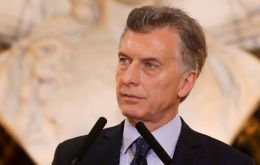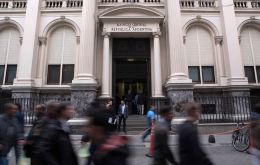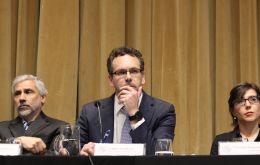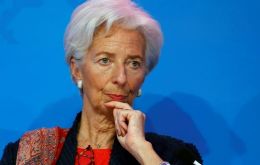MercoPress. South Atlantic News Agency
Tag: Guido Sandleris
-
Friday, March 15th 2019 - 08:48 UTC
Argentine inflation in February, 3.8% and 51% in twelve months; central bank new measures

Argentina’s stubbornly high inflation accelerated again in February, the government said on Thursday, sparking the central bank chief to pledge new measures to rein in rising prices that have dogged the South American economy over the last year.
-
Saturday, November 10th 2018 - 09:16 UTC
Argentina's central bank almost doubles currency swap with China

Argentina’s central bank said it would nearly double its currency swap deal with China, bringing the total to 130 billion Yuan (US$ 18.7 billion), as Beijing looks to expand its influence in the recession-struck country. Central Bank President Guido Sandleris, who was in China finalizing the agreement, said that the deal for 70 billion Yuan would be expanded by 60 billion Yuan, according to a bank spokesman.
-
Wednesday, October 24th 2018 - 08:40 UTC
Argentine Peso slips on Tuesday; central bank sells debt notes at a rate of 71.39%

Argentina’s peso slipped on Tuesday, a day after the central bank’s new governor reassured the public that its approach to taming the country’s rocky economy would be sustainable over the medium term. The peso closed 0.46% weaker at 36.65 per U.S. dollar. The currency has fallen 0.30% against the dollar this week, although it has climbed 12.63% since the beginning of the month.
-
Tuesday, October 2nd 2018 - 08:21 UTC
Argentine Peso rises 4% after central bank sells seven-day notes paying 72%

The he Argentine peso climbed more than 4% on Monday trading on the back of a debt sale by the central bank aimed at mopping up excess liquidity and signs that the International Monetary Fund (IMF) is solidly behind the administration of president Mauricio Macri.
-
Monday, October 1st 2018 - 08:56 UTC
Beijing currency swap support for Argentina

Argentina has “nearly closed” a new currency swap deal with China that will add the equivalent of US$ 9 billion to the South American country’s reserves, the central bank said on Sunday. Argentina and China first agreed to a swap program in 2009 to boost the South American country’s dwindling reserves under former President Cristina Fernandez. Last year, the center-right government of President Mauricio Macri and China agreed to extend the program for three more years.
-
Thursday, September 27th 2018 - 09:19 UTC
Argentine Peso with trading band and zero growth monetary supply policy

The International Monetary Fund Managing Director Christine Lagarde, speaking at a news conference in New York alongside Argentine Economy Minister Nicolas Dujovne, said IMF was “significantly frontloading” disbursements under the program adding the Argentine central bank had agreed as part of the deal to allow the peso currency to float freely and would only intervene in the foreign exchange market in extreme circumstances.
-
Tuesday, September 25th 2018 - 21:35 UTC
Who is Guido Sandleris, Argentina's Central Bank president after the surprise resignation of Caputo

The resignation of Luis Caputo to the Presidency of the Central Bank of Argentina (BCRA), which has been reflected with surprise by the international media, occurs amid the trip of the Argentine President, Mauricio Macri, to New York to attend the Assembly General of the UN and with the mission of restoring the confidence of the international market in the Argentine economy. His predecessor, Guido Sandleris, receives a Central Bank when it is about to close an agreement with the International Monetary Fund (IMF).
-
Tuesday, September 25th 2018 - 19:04 UTC
Argentine Central bank governor resigns for personal reasons: Peso slides 5% against the US dollar

The governor of Argentina's central bank, Luis Caputo resigned on Tuesday for personal reasons, the bank said in a statement, a surprise announcement in the midst of the country's talks with the IMF that sent the peso tumbling. Former finance minister Caputo has only held the role since June and is the second Argentine central bank president to resign this year. Argentina's peso currency slid 4.65% to open at 39.15 per U.S. dollar after the announcement, traders said.
-
Saturday, April 20th 2013 - 08:32 UTC
Argentines expecting inflation above 30% for the next twelve months

Argentines are expecting an inflation of 34.2% in the coming twelve months according to the average from a monthly report released by a prestigious private university research centre based on surveys,
-
Wednesday, March 20th 2013 - 23:40 UTC
Argentines expect inflation to reach 33.5% in the next twelve months

Argentines expect inflation to reach 33.5% in the next twelve months, according to the latest report from the Finance Research Centre, CIF, which belongs to the Torcuato Di Tella University. This is half a percentage point higher than the previous release.
